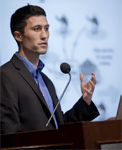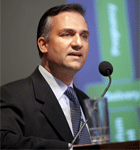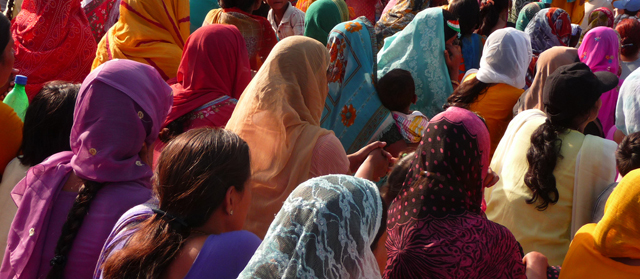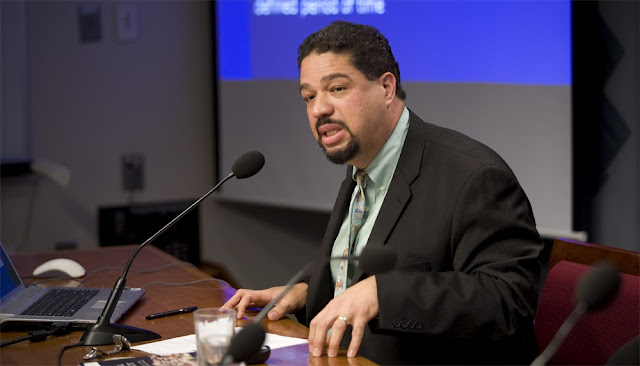Showing posts from category global health.
-
Meeting the Health Challenges of the Urban Poor
›November 2, 2010 // By Joshua NickellFifty percent of the world’s population now lives in cities, a figure that is predicted to rise to 60 percent by 2030, and 70 percent by mid-century, according to UN figures. The majority of this growth will occur in the Global South, where most of the world’s slums are found.
Why the rampant urban migration? Prospects for better health care, education, and employment are drawing the world’s poor out of rural areas into cities. But as the number of impoverished city-dwellers and slums grows, it is becoming increasingly important for society to consider how it will address the problems associated with this unprecedented degree of global urbanization.
At a recent event, “Meeting the Health Challenge of Urban Poverty and Slums,” co-hosted by the Wilson Center on the Hill program and the Comparative Urban Studies Project, Jacob Kumaresan, director of WHO Center for Health Development in Kobe, Japan, and Richard B. Lamporte, director of new program development, Jhpiego, discussed poverty and health challenges in rapidly growing urban slums.
The chances that the world’s rapidly growing number of city-dwellers will live a healthy and prosperous life depend on the services and opportunities cities can offer. As Kumaresan pointed out, there is currently no shortage of problems. Among other ills, he stated that 170 million urban residents currently do not have access to a latrine, while more than 1.2 million people will die from urban air pollution this year alone. As more individuals migrate to cities, these problems will be compounded.
Kumaresan also noted that cities have the “worst and the most unimaginable disparities when it comes to health.” While urban centers have more hospitals and attract many of the best doctors, the hospitals are often not managed or governed well. As a result, many poor urbanites suffer worse health care than their rural neighbors.
For instance, Kumaresan noted that tuberculosis rates in rural parts of India are half those of urban settings. Kumaresan also emphasized that these disparities are certainly not limited to the Global South: developed cities like New York and Los Angeles contend with similar inequities.
To address these issues, Kumaresan encouraged policymakers to examine the unique circumstances and conditions of their cities. “You’ve got to do analytical work to see what the problems are in each city, and to look not at the averages, but to unmask the differentials,” he said.
In Osaka, Japan, tuberculosis rates are 12 times higher than the rest of the country, said Kumaresan, primarily because of high affliction rates among its homeless population. As such, it is important for Osaka’s policymakers to address its tuberculosis problem by considering related socio-economic factors and following through with concrete policy actions.
Lamporte emphasized the importance of giving aid and development organizations flexible funding in order to allow them to better address unique local urban problems and inequities. He advised international donors to devote a certain percentage of their funding to integrated initiatives. “Certainly the goalposts could be set, but having some element of complementary funding … would be extremely useful,” he said.
As both Lamporte and Kumaresan pointed out, the future of the city is increasingly becoming the future of the world. As such, it is crucial to have “an urban optic going into the future,” according to Lamporte. If not, he argued, it will be at our own peril, as disease and unrest find increasingly sturdy footholds in urban slums. As the transformation from a rural to an urban planet continues, it will be essential for emerging and growing cities must use successful urban development techniques from both the Global North and the South.
Joshua Nickell is an intern with the Program on America and the Global Economy.
Sources: IRIN, Osaka University Graduate School of Medicine, UN, World Health Organization.
Photo Credit: “kibera_photoshow08,” courtesy of flickr user newbeatphoto. -
Mobile Phones for Maternal Health in the Developing World
›With rising use in the developing world, cell phones and mobile technologies can create “connected and coordinated health systems that save more lives,” said Josh Nesbit at the GHI event “New Applications for Existing Technologies to Improve Maternal Health,” on October 27. Capitalizing on these new technologies could increase efficiency, cost-effectiveness, and efficacy of public health programs. Nesbit, executive director of FrontlineSMS: Medic, was joined by Alain Labrique, assistant professor at the Johns Hopkins School of Public Health, and David Aylward, executive director of the mHealth Alliance at the United Nations Foundation, to discuss the role of Information and Communication Technologies (ICTs) in the prevention of maternal mortality.
Collaborations for mHealth
While “cell phones can’t save lives, the lack of information does kill,” said Aylward. Using technology that many people already own and use, mobile technology is an appropriate tool for disseminating health data and information. Existing technologies such as mobile phones and SMS text messaging can revolutionize healthcare by improving data collection and disease tracking, expanding patient diagnostics, and advancing education and awareness among health workers and patients.
With 64 percent of all mobile phone users located in the developing world, the use of mobile devices to improve health services in low-income countries is especially promising.
Aylward hopes that mobile health technology (mHealth) will help combat maternal mortality in the developing world. With approximately 350,000 women dying in childbirth each year, and only marginal progresses towards achieving Millennium Development Goal 5, finding such innovative solutions to improve maternal health is crucial.
Public-private partnerships are particularly important when considering the long-term sustainability of mHealth programs. “This didn’t happen because of the World Bank, it happened because people who are very poor voted with their very limited funds to have access to information,” said Aylward.
Aylward is hopeful that government and donor support will continue to become more supportive of mobile technology and coordinated in their implementation of mHealth programs globally.
Mobile Health Solutions in the Developing World
“Through mobile tools, we can act as quickly as possible to improve access to skilled birth attendants, emergency obstetric care, and access to reproductive health commodities,” said Nesbit.
Nesbit’s organization, FrontlineSMS: Medic, is working to eliminate barriers created by the lack of resources and infrastructure in the developing world using mobile health technology. Now working in 20 countries, the organization uses free software “that enables large-scale, two-way text messaging using only a laptop, a GSM modem, and inexpensive cell phones,” explained Nesbit.
“One of the best measures is whether people continue to use your tools, and they will if it impacts their lives positively and they won’t if it doesn’t—sometimes it’s as simple as that,” said Nesbit on why communities in the developing world are eagerly embracing mobile technology.
Moving forward, Nesbit hopes to “scale and replicate, both vertically and horizontally, models that we’ve shown can work, but also to build new tools” and work with the health community “to help identify the needs and the gaps in these systems.”
However, Nesbit stresses that “these are very much tools and not solutions; they become solutions when they are paired with people on the ground who use them.”
Compressing the Time Between Crisis and Care
“The opportunities for mobile phones to act synergistically with existing health systems in low- to middle-income countries are many,” said Labrique. The current challenge is to harness this technology to improve health outcomes in the developing world, where disease burden is disproportionately high.
In the developing world, “decisions influenced by the lack of resources, such as poverty, or lack of information have led to highly convoluted patterns of care-seeking,” said Labrique.
“Delayed decision-making compounded by delayed transport can have tragic consequences for maternal mortality,” said Labrique, and the most immediate use of mobile technology is “getting the necessary care, on time, to where these deaths are taking place.” Cell phones can help women, their families, and local health workers to seek timely, appropriate medical help for an obstetric emergency.
“Addressing equity and access to phones when evaluating the impact or success of mHealth interventions is critical,” Labrique said. Although cell phone use is high and steadily increasing, social and cultural norms in some countries might prevent women from using them. Further, Labrique notes, in Bangladesh, cell phone use among the poorest families is noticeably less than those with higher socioeconomic status.
“ICT and mHealth solutions have tremendous promise to improve maternal health in resource limited settings; however, it’s important not to let the technology guide the public health agenda,” said Labrique. More data is needed to determine how these tools might strengthen and enhance health systems and a clearer research agenda can help ensure evidence-based solutions guide programming.
For more from David Aylward and mHealth, be sure to see “Watch: David Aylward on How Wireless Technology is Changing Global Health and Empowering Women.”
Sources: Lancet, United Nations Foundation.
Photo Credit: “‘SMS till you drop’ — mobile phone ad on van in Kampala, Uganda,” courtesy of flickr user futureatlas.com. -
PATH Foundation’s ‘Population, Health, and Environment Leadership as a Way of Life’
›PATH Foundation Philippines, Inc. (PFPI) just released a short documentary, Population-Health-Environment (PHE) Leadership as a Way of Life in All Walks of Life. The video features interviews with peer educators and local government officials who have partnered with PFPI on integrated coastal resource management in the Philippines that combines family planning and reproductive health services with environmental services.
According to those interviewed, an integrated approach is the best way to alleviate food insecurity in the area. “We cannot separate population, health, and environment, they should be implemented hand in hand,” said Marlyn Alcanises, a Fisheries and Coastal Resource Management program officer. “Even if we manage our coastal resources well, if there are many children due to high fertility and population growth, many people are hungry.”
The comprehensive program has been successful in addressing the social and environmental problems in the Verde Island Passage of the Philippines, one of Asia’s most densely populated regions, as well as a marine biodiversity hotspot and sea lane for many commercial ships.
The program uses community-based distribution of contraceptives to increase access to family planning, micro-credit schemes to finance sustainable livelihoods and alleviate poverty, and advocacy campaigns to increase government support for integrated health and environment programs.
Municipal Planning and Development Coordinator Cecilia Zulueta praised the integrated approach, saying “it can slow down population growth, decrease the number of malnutrition cases, lessen the number of out-of-school youth, and it can also decrease the crime rate, because if one does not have a stable source of income it may force him to engage in illegal activities.”
In ECSP’s FOCUS Issue 15, “Fishing for Families: Reproductive Health and Integrated Coastal Management in the Philippines,” Joan Castro and Leona D’Agnes demonstrated that PFPI’s Integrated Population and Coastal Resource Management project (IPOPCORM) was more cost-effective and had a greater impact on the wellbeing of both human reproductive health and coastal resources than non-integrated programs. In a study measuring the impacts of integrated versus single-sector reproductive health (RH) or coastal resource management (CRM) programs, they found the integrated approach met or exceeded single-sector outcomes for 26 out of 27 indicators.
Reducing high fertility rates reduces pressure on natural resources, decreases high rates of malnutrition, crime and HIV/AIDS, and preserves local fisheries, “making life sustainable for both humans and nature,” as PFPI puts it in the documentary. The hope is that the community leaders featured in the documentary will inspire others in similar situations to take the lead on integrated issues in their communities.
“Even if we are doing environmental conservation through population management in our province but the others are not, it will still create conflict somehow,” said Alcanises. “I believe that whatever program is being done in one province should also be done in other provinces, in order to avoid conflict and promote balance in program implementation.”
Julio Lopez, president of the Galera Association of Managers and Entertainers said, “this land is ours, and we are responsible in taking care of it.”
PFPI, along with the University of Rhode Island’s Coastal Resource Center and Conservation International, is part of the BALANCED project, which last year launched the PHE Toolkit as a resource for PHE professionals. For more on PFPI’s IPOPCORM program, see ECSP’s interviews with Joan Casto and Leona D’Agnes on our YouTube channel: “Joan Castro – Integrated Population and Coastal Resource Management (IPOPCORM)” and “Leona D’Agnes on Population, Health, and Environment.”
Video Credit: “Population-Health-Environment (PHE) A Video Documentary,” courtesy of YouTube user PATHFoundationPhils.
Sources: Population Reference Bureau. -
Watch: David Aylward on How Wireless Technology is Changing Global Health and Empowering Women
›“We have millions of young children, babies, dying unnecessarily, hundreds of thousands of women dying in childbirth – most of them unnecessarily – in large part for lack of access to health, lack of access to health information,” said David Aylward, executive director of the UN Foundation’s mHealth Alliance. “And while wireless doesn’t solve any of those problems by itself, it is a conduit, a pathway to solve those problems.”
We spoke to Aylward before the Global Health Initiative (GHI) event “New Applications for Existing Technologies to Improve Maternal Health,” at the Wilson Center earlier this week.
“We’ve gone from a billion subscribers to five billion subscribers in the last six years, and 70 percent of those are in the developing world,” he said. “So almost everywhere you go a woman has a cellphone or has access to a cellphone.”
This access allows women in the developing world to do basic things those in the developed world take for granted, like call for help or set up reminders. The most important thing to think about in the future is to continue empowering women with the tools and knowledge to understand their own healthcare and supporting them with better care.
“All of which are possible in the very near term if we can get the different parties to get together and work on them together,” said Aylward, “and that’s what our mission is.”
Check out the the full event summary from GHI here. -
UNFPA State of World Population 2010
›Today marks the release of the United Nations Population Fund (UNFPA) annual State of the World Population Report. But the 2010 edition, “From Conflict and Crisis to Renewal: Generations of Change,” is unlike those that have come before. In lieu of the traditional statistic-driven report, this year’s edition has enlisted another tool to document living conditions across the world — storytelling. In addition to demographers, the UNFPA looked to journalists to fan out across the world to gather stories on the ground and paint a portrait of the challenges and opportunities facing today’s global population that goes beyond the numbers, with particular focus on gender issues and human insecurity.
For more on the UNFPA report, be sure to listen to The New Security Beat’s interview with one of its authors, Barbara Crossette, who talks about her experiences dealing with family planning around the world, as part of our ongoing Pop Audio series.
Video Credit: UNFPA. -
Barbara Crossette on UNFPA State of the World Population 2010 Report
› “Particularly when you go into a society that’s been broken by war or conflict or is so impoverished that is has nowhere to start climbing up, there have to be integrated programs and they have to work with people in mind,” said former New York Times foreign correspondent Barbara Crossette in an interview with The New Security Beat. “The people themselves will solve a lot of the problems around them if they’re just given the tools to do so.”
“Particularly when you go into a society that’s been broken by war or conflict or is so impoverished that is has nowhere to start climbing up, there have to be integrated programs and they have to work with people in mind,” said former New York Times foreign correspondent Barbara Crossette in an interview with The New Security Beat. “The people themselves will solve a lot of the problems around them if they’re just given the tools to do so.”
Crossette is one of the lead authors of the UN Population Fund’s latest State of the World Population Report, “From Conflict and Crisis to Renewal: Generations of Change,” set to launch this Wednesday, October 20th. She spoke to us particularly about the challenges of women around the world and the unique storytelling aspect of this year’s report.
The “Pop Audio” series offers brief clips from ECSP’s conversations with experts around the world, sharing analysis and promoting dialogue on population-related issues. Also available on iTunes. -
Gayle Tzemach Lemmon, Council on Foreign Relations
MDGs for Women Largely Unmet
›October 15, 2010 // By Wilson Center Staff
Excerpt from a First Take by Gayle Tzemach Lemmon at the Council on Foreign Relations:
Ten years after global leaders vowed to work toward eradicating extreme poverty, achieving universal primary education, reducing child mortality, and more, the eight Millennium Development Goals (MDGs) – particularly those relating to women – remain a distant hope. Though women were a focus of much discussion this week at the MDG summit in New York, the forward movement so far has been discouraging on the two MDGs directly relating to women: “promoting gender equality and empowering women” and “reducing by three-quarters the maternal mortality ratio.”
An MDG report released in June noted that when it comes to women, “progress has been sluggish on all fronts – from education to access to political decision-making.”While progress has been made on girls’ primary school enrollment, only three of ten regions are on track regarding women’s share of paid employment. The figure is even bleaker concerning women’s equal representation in national parliaments.
Data is still being collected, but early figures show the maternal mortality ratio reduction rate is “well short” of the 5.5 percent annual decline required to slash global maternal mortality by the MDGs’ stated 75 percent. Data from 1990 shows 430 maternal deaths per one hundred thousand live births. As of 2008, that figure had dropped only slightly to four hundred deaths per one hundred thousand live births, nowhere near the goal of below 150.
Continue reading at the Council on Foreign Relations.
Photo Credit: Adapted from “Untitled,” courtesy of flickr user :Bron:. -
Welcome Back, Roger-Mark: A Powerful Voice Returns to PHE
›October 13, 2010 // By Geoffrey D. Dabelko“I’m thrilled to be back.” That was the sentiment that Roger-Mark De Souza relayed to me, in his famous lilting baritone, about becoming the new vice president of research and director of the climate program at Population Action International (PAI). De Souza has long been a leading voice on integrated development programs that feature population, health, and environmental (PHE) dimensions. But three years as the Sierra Club’s director of foundations and corporate relations took him away from day-to-day work on these issues.
In his new posts, Roger-Mark will lead PAI’s research team in establishing a strong evidence base and engaging new allies in the effort to support healthier women and families, according to PAI. “Roger-Mark’s diverse research experience makes him an ideal fit for PAI as we undertake critical projects on reproductive health, population and environment issues,” said PAI President and CEO Suzanne Ehlers in a press release.PAI is a research-based advocacy NGO long known for innovative work connecting demographic considerations with other key development realms: mainly environment, security, and poverty. PAI’s policy-friendly briefs on population’s links with water, forests, and biodiversity provide practical meta-analysis of these complex and evolving connections. The organization’s more recent work on demographic security has been instrumental in advancing research and policy in that largely neglected arena.
De Souza captured his insights last year for our Focus series, in his brief, “The Integration Imperative – How to Improve Development Programs by Linking Population, Health, and Environment” (see also his follow-up interview on NSB). He combines lessons learned from community-based development efforts in Southeast Asia and East Africa with a savvy sense of the policy debates among donors and recipient countries alike.
This move reunites De Souza with Kathleen Mogelgaard, with whom he made key contributions to the PHE field as colleagues at Population Reference Bureau earlier this decade, and who is now Senior Advisor for Population, Gender, and Climate at PAI.
De Souza returns to his former focus on PHE issues at a time when the field is collectively searching for the best ways to respond to the challenges of climate mitigation and adaptation, as well as ongoing hurdles such as scaling up, sustainability, and labeling.











